On World Mental Health Day, explore the essentials of mental health, including its significance, common myths, early warning signs, and practical tips for improving mental well-being. Learn how to support yourself and loved ones effectively.

Understanding Mental Health: A Comprehensive Guide
What is Mental Health?
The Importance of Mental Health
Mental health is about how we think, feel, and connect with others. It affects our emotions, actions, and stress levels. Like physical health, mental health is crucial for a happy life. When we’re mentally healthy, we handle challenges better, build strong friendships, and enjoy life more.
How Mental Health Affects Daily Life
Stress is a normal response to the challenges we face every day, like schoolwork, sports, or social pressures. However, it can quickly become unhealthy when it starts to interfere with your daily life. Stress brings about changes that affect almost every system in your body. These changes influence how you feel and behave.
The Role of Stress in Mental Health
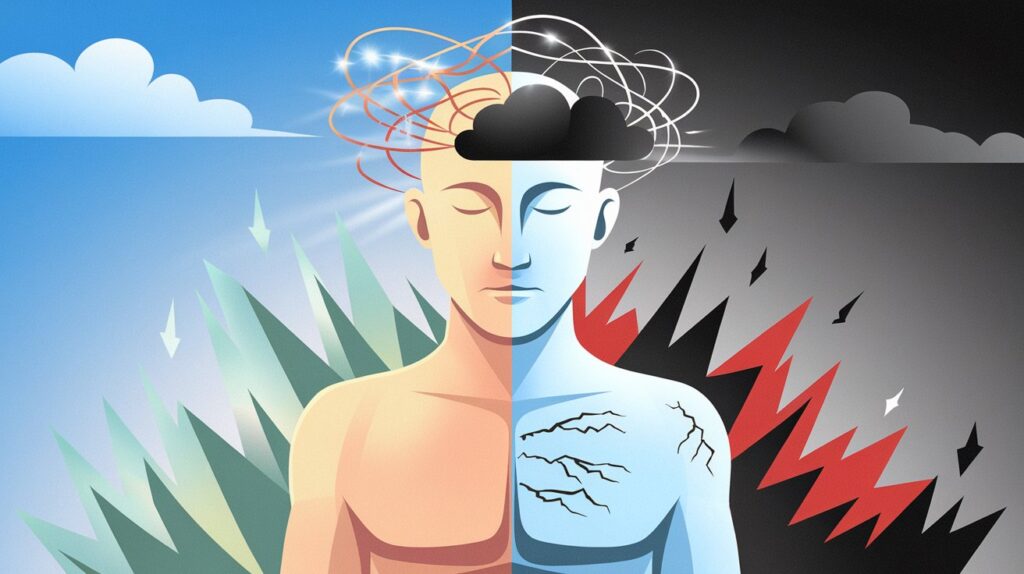
Normal vs. Unhealthy Stress
When stress causes changes in both your mind and body, it can lead to problems like anxiety or even physical illnesses.
The Impact of Stress on Emotions and Behavior
This can make you feel less happy and lower your quality of life. Because of this, understanding stress and learning to manage it is very important for staying healthy and feeling your best!
Why Mental Health Matters
Resilience and Coping with Challenges
Mental health is super important for everyone, no matter how old you are! It affects how we think, feel, and act every day. When our mental health isn’t in a good place, it can lead to problems that not only impact us but also our friendships and family relationships. So, understanding mental health is key to living a happy and balanced life!
Boosting Self-Confidence and Productivity
Good mental health helps us deal with life’s ups and downs. It allows us to bounce back from tough times and connect with friends and family. However, when our mental health struggles, it can impact our mood, energy, schoolwork, and relationships.
Strengthening Relationships
When your mind and emotions are in a good spot, you can tackle life’s challenges more easily. Whether it’s homework stress or conflicts with friends, feeling mentally strong helps you deal with these situations better. Instead of turning to unhealthy habits like isolating yourself or acting out, you’re more likely to find positive ways to cope. This resilience helps you face problems head-on with a clearer mind!
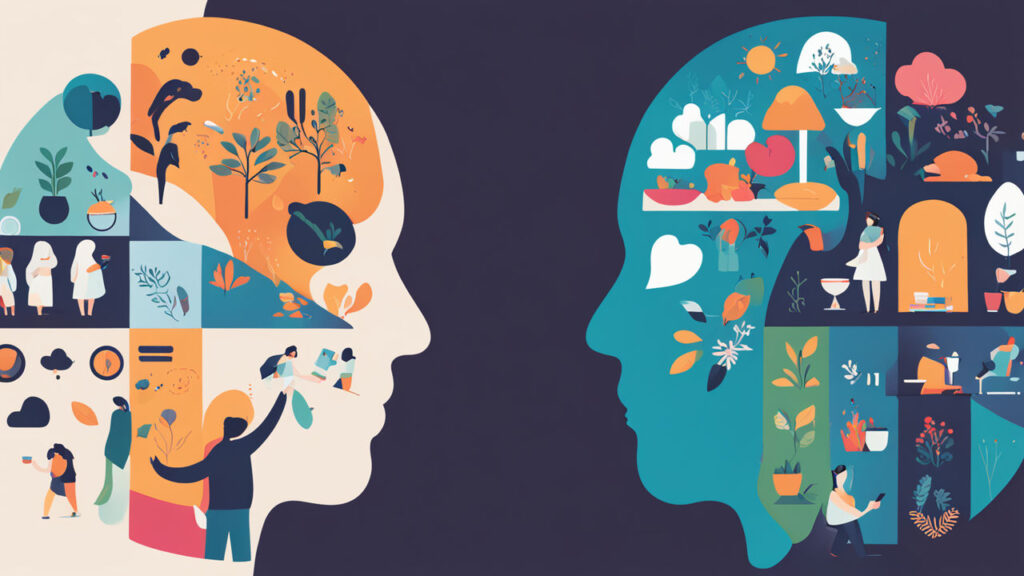
Enhancing Quality of Life
When you’re feeling good mentally, your self-esteem often rises. You start to see the awesome qualities you have! Confident people usually set exciting goals and strive for a happy life. So, when you recognize your strengths, you’re not just lifting yourself up—you’re also making a positive impact on those around you!
Breaking the Silence: Uncovering Common Mental Health Myths!
Mental health issues are rare.
You might think that problems like anxiety or depression don’t happen to many people, but that’s not true! Even before the COVID-19 pandemic, it was estimated that 1 in 4 people worldwide would face mental health challenges at some point in their lives. That’s a lot of people!

Panic attacks can be deadly.
Panic attacks feel really scary, like your heart is racing and you can’t breathe. But here’s the good news: they aren’t actually life-threatening. However, if someone is having a panic attack, they might not be paying attention to their surroundings and could accidentally hurt themselves. If you ever feel a panic attack coming on, try to find a quiet place where you can relax.
People with mental health issues can’t work.
There’s a common myth that people who struggle with mental health can’t hold jobs or be part of a team. This couldn’t be further from the truth! While some people may find it hard to work during tough times, many individuals with mental health challenges can do just as well in their jobs as anyone else.
Mental health problems mean you’re weak.
This idea is as silly as saying a broken leg means someone is weak! Mental health issues are medical conditions, not reflections of your character. Just like someone with diabetes can’t just “snap out of it,” a person with depression can’t magically feel better overnight. In fact, it often takes a lot of courage and strength to confront these challenges.
Only people without friends go to therapy.
You might think that if someone goes to a therapist, it means they don’t have friends. But that’s a misconception! Talking to friends can be helpful, but therapists are trained to help people work through their feelings in a way that friends might not know how to do. Plus, therapy is a safe space where you can share your thoughts without judgment, something that’s not always possible with friends.
Understanding these myths can help us support ourselves and others better. Mental health is important for everyone, and talking about it openly helps break down these misconceptions!
Understanding Mental Health: Key Points to Know
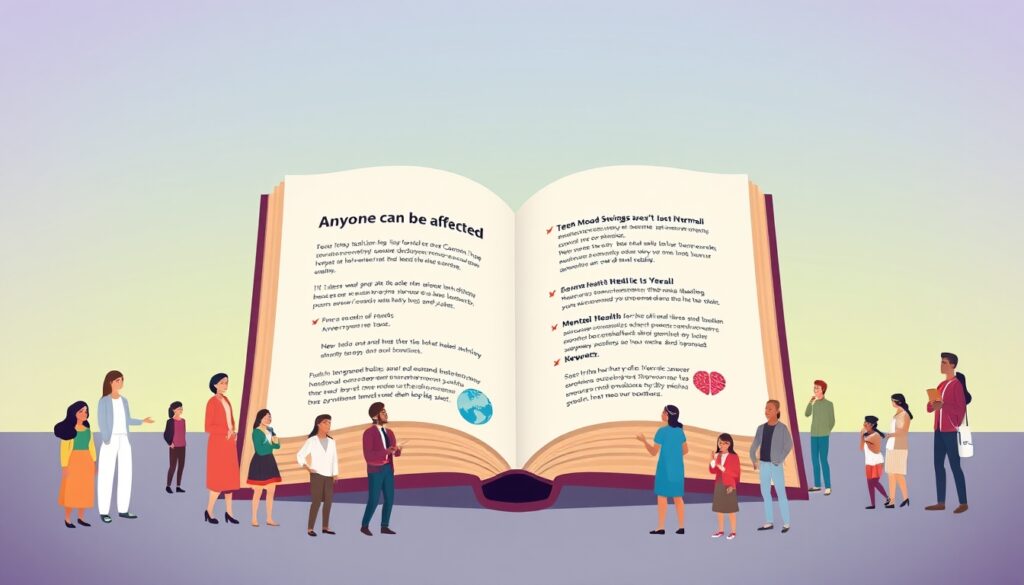
Anyone Can Be Affected:
First and foremost, mental health issues can touch anyone, regardless of how smart you are, how much money you have, or what your social life looks like. Therefore, it’s important to remember that mental health is a big deal for everyone! In fact, according to Mental Health of America, Nearly 1 in every 5 adults will have a diagnosable mental health condition in any given year.
Teen Mood Swings Aren’t Just Normal:
While it’s super common for teenagers to feel moody—especially with all the changes happening in life—these mood swings don’t always mean there aren’t deeper issues going on. In fact, since half of all mental health conditions start by age 14, getting help early can really make a difference. Many of the most common mental disorders, particularly those that can have a serious impact on well-being, often start in childhood or adolescence (Kessler & Wang, 2008). This highlights just how crucial it is to pay attention to mental health from a young age!
Not All Violent Crimes Are Linked to Mental Health:
Moreover, people often think that those with serious mental health disorders are dangerous. However, it’s essential to note that only about 5% of violent crimes are committed by people with these disorders. This distinction is important to understand mental health better.
Mental Health Is Real:
Additionally, just like any physical health issue, mental health conditions are real problems. Doctors can prescribe medicine to help manage these conditions, making it easier for people to go about their daily lives, just like they would for other health issues.
Bipolar Disorder Can Have Long Cycles:
In the case of bipolar disorder, mood changes can last for weeks or even months. While these cycles don’t change quickly, sudden swings in a person’s emotions can occur. Consequently, understanding this can help friends and family know when to provide support.
It’s Not About Willpower:
Importantly, having a mental health condition isn’t about making a choice or lacking willpower. Rather, anyone can experience these issues, so it’s vital to recognize that mental health challenges can affect anyone.
Many Factors Influence Mental Health:
Furthermore, a wide range of experiences can impact someone’s mental health. For instance, relationships with parents and guardians are just one piece of the puzzle. Even someone in a loving home can face mental health challenges, just like someone in a less supportive environment. Thus, it’s a reminder that mental health is complicated!
Workplaces Can Be Supportive:
Lastly, people with mental health conditions can excel in their jobs, especially in workplaces that promote mental well-being. When companies create a positive environment, it helps everyone thrive. This means encouraging open conversations about mental health and providing resources to support employees.
Early Signs of Mental Health Issues
Recognizing early signs of mental health issues can help you or someone you care about get the support needed before things become overwhelming. Here’s a more detailed look at some key signs to watch for:
Withdrawing from Friends and Family
If someone begins to spend less time with friends or family, it could indicate they’re feeling sad or anxious. This withdrawal might mean they feel overwhelmed or don’t want to burden others with their problems. As a result, isolation can increase feelings of loneliness and make it harder to reach out for help.
Losing Interest in Hobbies
When activities that used to bring joy—like sports, music, or hanging out with friends—no longer seem appealing, it may be a sign of depression. This disinterest can create a cycle where the person feels increasingly disconnected and may stop participating in activities that once made them happy.
Changes in Sleep Patterns
Sleep is essential for good mental health. If someone is either sleeping too much or having trouble sleeping, it can significantly affect their mood and energy levels. Lack of sleep can lead to irritability and difficulty concentrating, while too much sleep can make a person feel sluggish and unmotivated.
Eating Changes
Significant changes in eating habits, whether overeating or eating very little, can signal emotional distress. For example, some people might use food as a way to cope with their feelings, leading to weight gain or health issues. On the other hand, a loss of appetite can indicate depression or anxiety, affecting overall energy and health.
Feeling Hopeless
A persistent sense of hopelessness can be one of the most alarming signs. When someone feels like nothing will improve, it can be difficult for them to see any way forward. This feeling can drain motivation and make even simple tasks seem overwhelming.
Low Energy
Constantly feeling tired, even after a full night’s sleep, can indicate mental health issues. Low energy can impact daily activities, making it hard to focus on schoolwork or enjoy social interactions. This fatigue often leads to a lack of motivation and can increase feelings of frustration.
Increased Use of Substances
Some people may turn to alcohol, drugs, or other substances to cope with their feelings. While it might provide temporary relief, this behavior can lead to dependency and create additional problems, both mentally and physically.
Expressing Negative Emotions
Frequent feelings of anger, sadness, or anxiety can be signs of deeper issues. If someone is often upset or overwhelmed, these emotions can build up, making it hard to enjoy life. It’s important to acknowledge these feelings and understand they might indicate a need for support.
Difficulty Focusing
Feeling confused or having trouble concentrating can impact school performance and daily responsibilities. When someone struggles to focus, they may find it hard to remember things, which can lead to increased stress and frustration.
Struggling with Daily Tasks
If everyday activities, like getting ready for school or completing chores, feel overwhelming, it might signal a deeper emotional struggle. When these tasks seem too difficult, it can lead to feelings of inadequacy and shame.
Recurring Intrusive Thoughts
Having constant, unwanted thoughts or memories can be distressing. These intrusive thoughts can interfere with daily life and may indicate anxiety or post-traumatic stress. It’s crucial to address these feelings before they become more overwhelming.
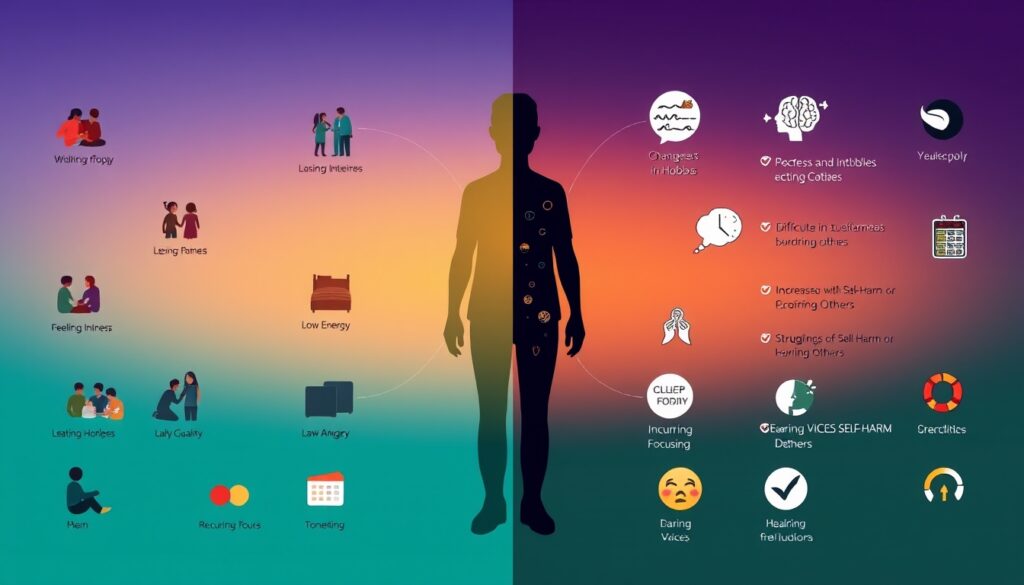
Thoughts of Self-Harm or Harming Others
If someone is contemplating self-harm or thinking about hurting others, it’s essential to seek help immediately. These thoughts often arise from feelings of hopelessness or overwhelming distress and require urgent support.
Hearing Voices or Experiencing Delusions
Hearing voices or believing in things that aren’t true can be serious symptoms of mental health issues, such as psychosis. These experiences can significantly impact a person’s reality and functioning, making professional help vital.
Easy Tips for Better Mental Health!
Taking care of your mental health is super important! Here are some fun and easy steps to help you feel your best, according to experts:
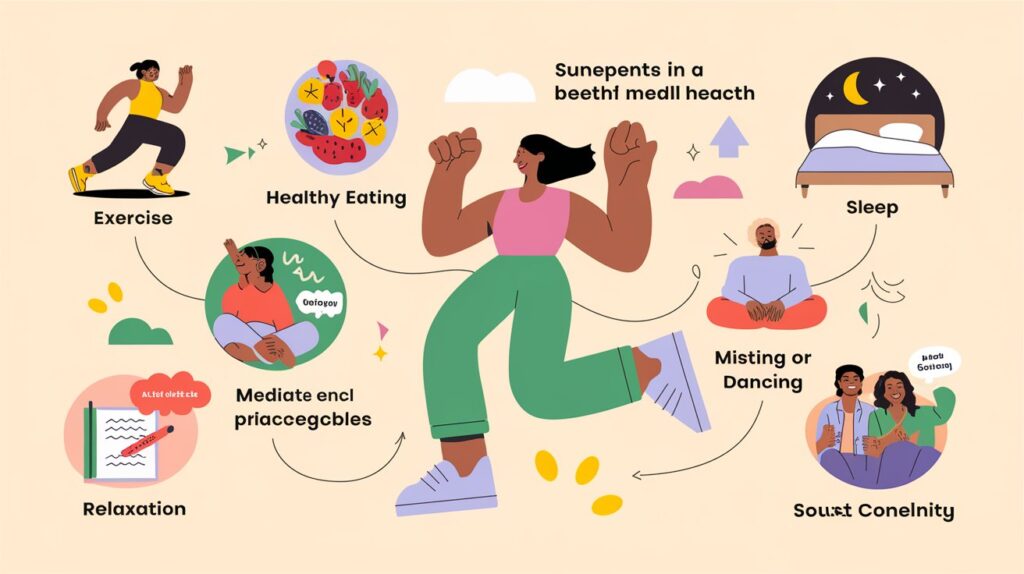
Get Moving with Regular Exercise:
For starters, aim to be active for 45 minutes, three to five times a week. Whether it’s dancing, biking, or playing a sport, exercise releases endorphins—those awesome chemicals that boost your mood. Additionally, staying active helps you feel more energetic and accomplished, which is great for your mental health.
Eat Right and Stay Hydrated:
Moreover, eating a balanced diet and drinking enough water can keep your energy levels steady all day long. Fill your plate with colorful fruits, veggies, whole grains, and proteins. These foods provide your brain with the nutrients it needs to function well. And don’t forget to drink plenty of water; even a little dehydration can make you feel tired and unfocused.
Aim for Quality Sleep:
Furthermore, getting good sleep is crucial for feeling happy and alert. A 2021 study showed that better sleep leads to improved mental health. Try to stick to a regular bedtime and create a relaxing nighttime routine, like reading or listening to calming music. This will help you recharge your brain and tackle the next day with a positive attitude!
Engage in Relaxing Activities:
In addition, take time for activities that help you chill out. Breathing exercises, meditation, or even using wellness apps can reduce stress. Journaling is also a great way to express your feelings. Setting aside a few minutes each day for these activities can make a big difference in how you feel.
Practice Mindfulness and Gratitude:
At the end of each day, consider reflecting on things you’re grateful for and jotting them down. This simple habit can shift your focus from worries to positive experiences. Likewise, mindfulness activities, like meditation or just taking a moment to breathe deeply, help you enjoy the present and reduce anxiety.
Build Positive Social Connections:
Lastly, spending time with friends and family can lighten your mood and offer support when you need it. Whether it’s chatting, playing games, or just hanging out, connecting with others creates a sense of belonging. Good relationships can help you feel happier and more secure, which is essential for your mental well-being.
By following these steps, you can take charge of your mental health and feel great every day! Remember, it’s all about finding what works for you and making your well-being a priority. And, always remember that an expert is an expert. Always seek help when you feel it’s taking a toll over you !
How to Help a Loved One with Mental Health Challenges
Supporting a friend or family member who is struggling with mental health can really make a difference. Here’s how you can step in and help them feel better:
Watch for Changes in Their Behavior and Mood.
First things first, keep an eye out for any changes in how your loved one acts or feels. This could mean they’re more tired, not eating well, or even pulling away from friends. These signs can hint that they might be facing mental health issues, and recognizing them is the first step in getting help.
Start a Conversation and Ask How They’re Feeling.
Next, don’t hesitate to talk to them. Ask how they’re doing, especially if they’ve been through something tough, like a breakup or losing someone close to them. Letting them know you care can create a safe space for them to share what’s on their mind.
Encourage Them to Talk to a Doctor or Mental Health Professional.
It’s also important to suggest they speak with a doctor or a counselor if they’re having a hard time. These professionals can offer the right guidance and support. You can help by researching mental health providers together or discussing any worries they have about seeking help.
Offer to Help Find Treatment Providers or Go with Them.
Additionally, you can take action by helping them find a mental health provider that fits their needs. Whether it’s setting up an appointment or going with them to their first session, your support can make the process less scary and show them they’re not alone.
Check In Regularly.
Make it a habit to check in with them often. A simple text or call asking how they’re doing can really brighten their day. This shows that you care and are there for them, which can be a huge comfort during tough times.
If They’re at Risk of Suicide, Don’t Leave Them Alone.
Most importantly, if you think someone might be thinking about suicide, it’s critical to take action immediately. Stay with them and don’t leave them alone. Call local crisis hotline for help. Your presence can provide comfort while waiting for professional support.
In the end, having friends and family who care can significantly impact someone’s recovery. Research shows that many people who have suicidal thoughts might choose not to act on them because of the support they receive from their loved ones. Your involvement can be a lifeline, helping them through tough times and giving them hope for the future. Remember, being a good friend can truly make a difference!
Conclusion: Fostering Mental Health Awareness
In conclusion, recognizing the early signs of mental health challenges is crucial. This awareness helps create a supportive environment for ourselves and others. If you’re struggling with difficulties or notice changes in someone close to you, reaching out for help can lead to positive change. Remember, mental health is just as important as physical health. Prioritizing it can lead to a more fulfilling and balanced life.
Moreover, we should encourage open conversations about mental health. By challenging misconceptions, we can build a more understanding community. Let’s embark on this journey together. Supporting one another and seeking help when needed can dismantle stigma and uplift each other. This ensures that no one feels isolated in their struggles.
Ultimately, taking proactive steps today is vital. Simple actions, like self-care practices or checking in on a friend, can have a big impact. Let’s commit to prioritizing our mental well-being and that of those around us. Together, we can create a future filled with hope and resilience